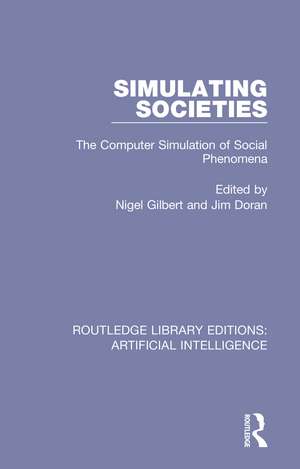Simulating Societies: The Computer Simulation of Social Phenomena: Routledge Library Editions: Artificial Intelligence
Editat de Nigel Gilbert, Jim Doranen Limba Engleză Paperback – 6 mai 2020
Simulating Societies shows how computer simulations can help to clarify theoretical approaches, contribute to the evaluation of alternative theories, and illuminate one of the major issues of the social sciences: how social phenomena can "emerge" from individual action. The authors discuss how simulation models can be constructed using recently developed artificial intelligence techniques and they consider the methodological issues involved in using such models for theory development, testing and experiment. The introductory chapters situate the book within social science, and suggest why the time was ripe for significant progress, before defining basic terminology, showing how simulation has been used to theorize about organizations, and indicating through examples some of the fundamental issues involved in simulation. The main body of the text provides case studies drawn from economics, anthropology, archaeology, planning, social psychology and sociology.
The appeal of this path-breaking book was twofold. It offered an essential introduction to simulation for social scientists and it provided case study applications for computer scientists interested in the latest advances in the burgeoning area of distributed artificial intelligence (DAI) at the time.
| Toate formatele și edițiile | Preț | Express |
|---|---|---|
| Paperback (1) | 282.45 lei 6-8 săpt. | |
| Taylor & Francis – 6 mai 2020 | 282.45 lei 6-8 săpt. | |
| Hardback (1) | 931.42 lei 6-8 săpt. | |
| Taylor & Francis – 14 mai 2018 | 931.42 lei 6-8 săpt. |
Preț: 282.45 lei
Preț vechi: 353.06 lei
-20% Nou
Puncte Express: 424
Preț estimativ în valută:
54.05€ • 55.77$ • 45.75£
54.05€ • 55.77$ • 45.75£
Carte tipărită la comandă
Livrare economică 05-19 martie
Preluare comenzi: 021 569.72.76
Specificații
ISBN-13: 9780815349310
ISBN-10: 0815349319
Pagini: 320
Dimensiuni: 138 x 216 x 17 mm
Greutate: 0.45 kg
Ediția:1
Editura: Taylor & Francis
Colecția Routledge
Seria Routledge Library Editions: Artificial Intelligence
Locul publicării:Oxford, United Kingdom
ISBN-10: 0815349319
Pagini: 320
Dimensiuni: 138 x 216 x 17 mm
Greutate: 0.45 kg
Ediția:1
Editura: Taylor & Francis
Colecția Routledge
Seria Routledge Library Editions: Artificial Intelligence
Locul publicării:Oxford, United Kingdom
Public țintă
Postgraduate, Professional, and UndergraduateCuprins
Preface. Contributors. 1. Simulating Societies: An Introduction Jim Doran and Nigel Gilbert 2. Simulation of Complex Organizational Processes: A Review of Methods and their Epistemological Foundations Ann C. Séror 3. The Evolution of Technologies Klaus G. Troitzsch 4. Simulating the Emergence of Social Order from Individual Behaviour Andrzej Nowak and Bibb Latané 5. The Architecture of Society: Stochastic Simulation of Urban Movement Alan Penn and Nick Dalton 6. Multi-agent Simulation as a Tool for Studying Emergent Processes in Societies Alexis Drogoul and Jacques Ferber 7. Simulating Fishermen’s Society F. Bousquet, C. Cambier, C. Mullon, P. Morand and J. Quensiere 8. Simulating Prehistoric Hunter-Gatherer Societies Steven Mithen 9. The EOS Project: Modelling Upper Palaeolithic Social Change Jim Doran, Mike Palmer, Nigel Gilbert and Paul Mellars 10. Learning to Co-operate Using Cultural Algorithms Robert G. Reynolds 11. The Simulation of Trade in Oligopolistic Markets José Castro Caldas and Helder Coelho 12. Mind is Not Enough: The Precognitive Bases of Social Interaction Rosaria Conte and Cristiano Castelfranchi. References. Index.
Descriere
The most exciting and productive areas of academic inquiry are often where the interests of two disciplines meet. This is certainly the case for the subject of this book, first published in 1994, which explores the contribution that computer-based modelling and artificial intelligence can make to understanding fundamental issues in social science.










